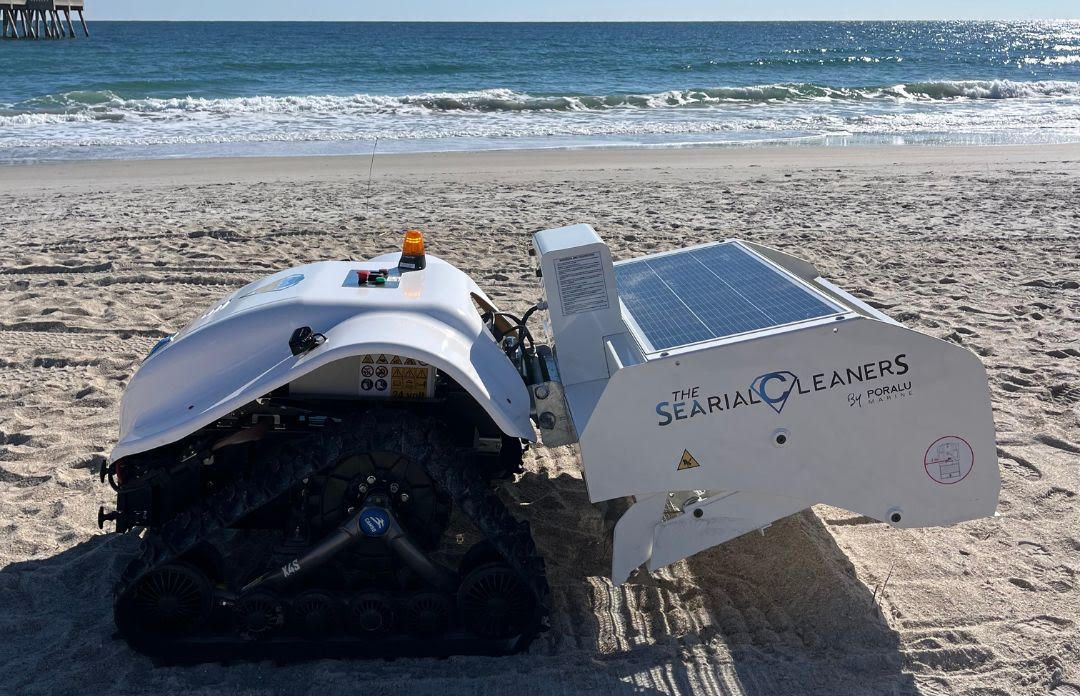
Want hard-to-spot plastic straws, cigarette butts and bottle caps off North Carolina beaches? This is the droid you’re looking for.
Say hello to BeBot, the first and only solar- and battery-powered, automated beach sweeper in the state and one of less than a dozen being operated in the country.
Supporter Spotlight
BeBot made its North Carolina debut on Carolina Beach, where Keep New Hanover Beautiful Executive Director Dick Brightman showed it off during a pop-up demonstration in late October.
A month later, officials with various regulatory agencies gathered on Wrightsville Beach’s shore to watch BeBot in action.
As with any type of equipment, be it a dredge pipe or shoreline rake-pulling pickup, BeBot cannot be operated without a proper permit. Not even a droid can escape the rigors of passing muster with Coastal Area Management Act, or CAMA, minor permit.
BeBot is roughly the size of a zero-turn lawnmower. It weighs a little more than 1,350 pounds, can reach speeds up to 3 mph and has a battery life of a few hours.
And while it’s not designed to clean entire beachfronts – BeBot can cover about 5,000 square feet over 20 to 25 minutes, according to Brightman – what makes it unique is its ability to sweep up small, difficult-to-see plastics and cigarette butts lurking just beneath a sandy surface.
Supporter Spotlight
BeBot is equipped with a blade that grazes no deeper than 4 inches below the surface, pushing sand onto a metal grate that sifts the sand back onto shore while capturing trash in a back compartment. That trash then can be dumped at an area and taken off the beach.
The depth with which it scratches the surface, its size and tracked wheels make it low-impact on a shoreline, Brightman said.
And, because BeBot is remotely controlled onsite by a human, “we can maneuver it around any areas we don’t want it to be, vis-à-vis turtle nesting areas,” he said.
“It’s very, very maneuverable,” he said. “It’ll turn 360 degrees standing still. I was amazed at how easily it can be maneuvered.”
BeBot has been awarded to other beautification organizations in Florida, Ohio and Lake Tahoe in recent years by various nonprofits, including Keep America Beautiful, the national organization founded in the early 1950s that has more than 700 community affiliates.
The bot is a creation of Italy-based NITEKO Robotics and distributed by The Searial Cleaners, a subsidiary of Poralu Marine in France. All told, a single bot and a trailer to haul it costs about $80,000.
BeBot is not meant to replace human-led beach litter sweeps, but rather to be used to raise awareness about smaller pieces of trash and plastics that tend to get overlooked on beaches.
But Brightman’s hope is that BeBot will eventually circulate from beach town to beach town where it can be used to not only demonstrate how much trash is just beneath a shore’s surface, but utilized to sweep more heavily used areas of a beach, including those around piers and resort areas.
“We’re trying to get it out on the beaches now because we want to get some exposure,” he said. “Ideally what I want to do is one event a month, including in the summer season.”
He has a permit application in to the North Carolina Division of Coastal Management to operate BeBot at Wrightsville Beach’s Crystal Pier.
Beach towns interested in using BeBot will have to obtain their own CAMA minor permit to use the bot.
Katie Ryan, Wrightsville Beach’s recreation program supervisor, said the town supports Brightman’s efforts to raise awareness about trash on the beach.
“I think any effort to clean up anything on the beach is worthwhile,” she said.







